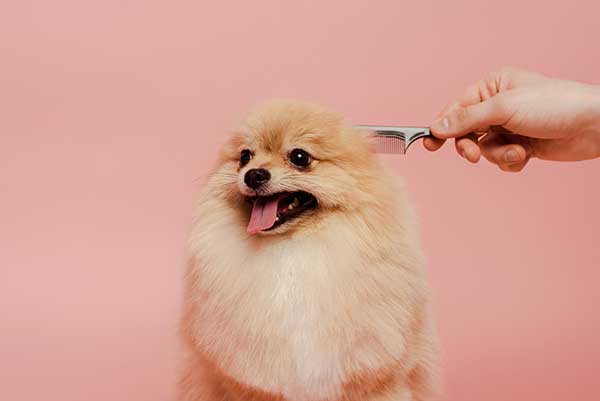There are numerous factors that aspiring pet parents often put into consideration before bringing a dog home. One of those factors is the allergic nature of the dog.
Indeed, no one would wish to have a dog whose presence in the house triggers all manner of allergic reactions.
Now, Pomeranians rank among the most popular dog breeds in many homes around the world. The primary reason behind the popularity of this dog breed is their fluffy coat and moderate-shedding characteristics, which limits the extent to which owners are exposed to their dander.
But are Pomeranians allergy-friendly dogs? Are Pomeranians hypoallergenic?
Unfortunately, Pomeranian dogs aren’t hypoallergenic dogs. While Pomeranians aren’t heavy shedders, they still shed just frequently enough to trigger dander-related allergies. And like all dogs, Pomeranian dogs secrete saliva which contains the protein that also triggers pet allergies.
Read on for more insights on the topic.
More About Pomeranians
One of the frequently asked questions by pet parents intending to adopt a Pomeranian is, ‘are Pomeranians hypoallergenic dogs?’
As we’ve just indicated, Pomeranians aren’t really hypoallergenic. But before we examine the potential for developing allergic reactions from a Pomeranian, let’s begin easy by understanding what these dogs are.
A Pomeranian goes by numerous other names, including Deutscher Spitz, Dwarf-Spitz, Pom-Dog, Pom-Pom, Zwergspitz, Tumbleweed, to mention but a few.
The dogs originated from the Pomerania region in north-west Poland, as well as north-east Germany. They’re classified as toy dogs due to their diminutive size. Pomeranians share close similarities with their larger Spitz-type dogs, such as the German Spitz.
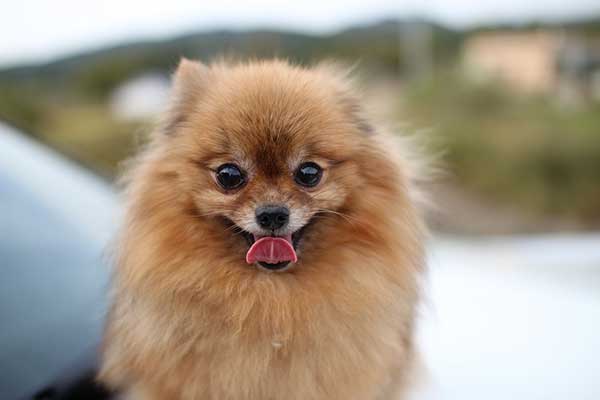
1. Origin
The modern-day Pomeranian breeds are descendants of large working dogs that were more widespread around the Arctic regions.
The dogs are generally known as Spitz or Wolfspitz which loosely translates to ‘sharp point’ in German, and portrays the features of the dog’s nose and muzzle.
As for many other dog breeds, the British Royal Family played a crucial role in popularizing Pomeranians. Both Queen Charlotte and his granddaughter, Queen Victoria, were renowned enthusiasts of Pomeranians.
Other notable royal owners of Pomeranian dogs include King George IV of England and Joséphine de Beauharnais – the wife of Napoleon I of France.
Pomeranians were first registered as a distinct dog breed by the American Kennel Club (AKC) in 1898. After that, selective breeding further spurred their popularity. Over the years, Pomeranians have featured among the top 20 dog breeds registered by the AKC.
2. Physical Characteristics
As we’ve already pointed out, Pomeranians are relatively small dogs. Adults typically weigh between 3 and 7 pounds, and stand 8 – 14 inches tall. The dogs are compact, sturdy, and feature an abundant textured coat that’s completed with a highly-plumed tail.
Pomeranians draw their signature appearance from a ruff of fur that forms on their necks.
The dogs were traditionally white. However, modern-day Pomeranians can sport a wide range of colors, including white, black, orange, brown, blue, red, sable, spotted, brindle, or a combination of these colors.
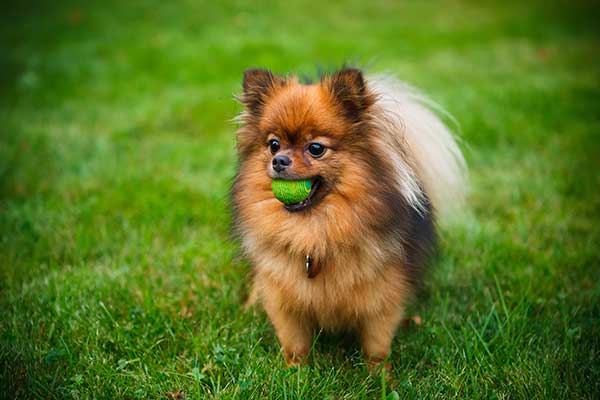
3. Behavioral Characteristics
Pomeranians are friendly, lively, and hyperactive dogs. That explains why they generally get along with children and other pets. Their mellow disposition and small size is an excellent combination when looking for a perfect dog for a family with young children.
However, their calm and relaxed demeanor doesn’t make them any less aggressive. Pomeranians can get fairly aggressive, especially when trying to defend their territory or prove a point to other dogs.
These dogs generally don’t bark a lot. But like most other dogs, Pomeranians are creatures of habit and may bark in response to changes in their environments.
Pomeranians are also fairly intelligent and attention-seeking dogs, which makes training them a breeze. But don’t forget that they can also be obstinate and strong-willed, especially when they need to assert their dominance.
4. Health and Life Expectancy
Pomeranians can live between 12 and 16 years. They exhibit similar health issues as many other dogs, which include hip dysplasia and dental diseases.
- ACTIONABLE HEALTH INSIGHTS: Test for over 270 genetic health conditions and get actionable insights to help you give your pup the best care possible….
- MOST ACCURATE BREED IDENTIFICATION: Test for over 350 dog breeds including dingoes, coyotes, wolves, and village dogs. Using a research-grade…
- TRAIT INSIGHTS THAT HELP YOU BE MORE PREPARED: Test for 55 physical traits. Size, coat, grooming needs — your dog’s traits don’t just make them…
Last update on 2025-01-13 / Affiliate links / Images from Amazon Product Advertising API
What Does ‘Hypoallergenic’ Mean And Do Pomeranians Cause Allergies?
Hypoallergenic is a term that you’ll often come across when shopping for cosmetic products, especially those products meant for topical application. Basically, the term is used to refer to a product that’s less likely to cause an allergic reaction.
Over the years, the term has also found its way into the pet industry. The opposite of hypoallergenic is hyperallergenic, which now refers to a product that is almost certain to trigger allergic reactions.
Before bringing a dog home, it’s imperative that you understand how allergy-friendly the dog is. That’s particularly true if you’ve never owned the breed before.
First up, finding an allergy-friendly dog means avoiding shelter homes and rescue centers at all costs. Instead, insist on acquiring your pooch from a licensed breeder. Buying your dog from a reputable breeder is one the best ways to vouch for the dog’s physical and behavioral traits.
However, beware of salesy breeders who pitch a dog purely on the basis of his hypoallergenic nature, even if the dog in question is a Pomeranian. That’s for the simple reason that no dog is truly hypoallergenic.
Admittedly, some dogs present lower risks of triggering allergic reactions compared to others. However, no dog can be termed as allergy-free. So, if you’re trying to adopt a Pomeranian, the more pertinent question you should ask is how much risk of allergy your soon-to-be furry friend presents.
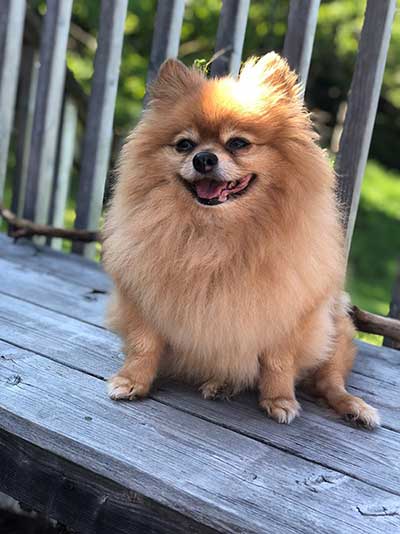
Why Aren’t Pomeranians Considered Hypoallergenic?
Since we’ve already mentioned that all dogs carry some risks of allergy, you may now be wondering, are Pomeranians good for allergy sufferers?
Pomeranians are comparatively great for allergy sufferers. However, that depends on how you handle the dog. Much on that later on.
For now, let’s address some of the reasons why Pomeranians may trigger allergic reactions.
Now, many pet parents associate dog allergies with their hair and fur. However, the real culprit is the dander. Dander refers to the tiny pieces of dead skin cells that dogs secrete from time to time, particularly when they shed.
When the dander from Pomeranians comes into contact with your skin, it may trigger hypersensitive reactions, especially if you’re already allergic to this specific allergen. What makes pet dander even more deadly is that they’re generally microscopic and difficult to detect by the human eye.
But a Pomeranian’s allergy-inducing protein isn’t only concentrated on the dog’s dander. The protein is also fairly abundant in his urine and saliva. So, even if Pomeranian dogs did not shed at all, the fact that they pee and secrete saliva still increases their potential for causing allergic reactions.
The following are some of the symptoms of allergy in dogs;
- Sneezing, which is usually accompanied by a runny or stuffy nose,
- Facial pain, often resulting from nasal congestion,
- Watery, itchy, or red eyes,
- Coughing and wheezing,
- Chest tightness and shortness of breath,
- Hives or skin rash, and
- Inflammation on the area of the skin where you’ve been exposed to the allergy-causing protein
If you notice any of the above symptoms and have been exposed to a dog’s dander, urine, or saliva, you should consult your doctor immediately. Fortunately, there’s a saving grace.
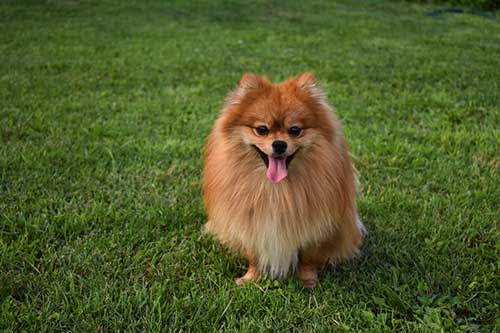
First, not everyone is sensitive to the allergy-causing protein in dogs. According to the American College of Allergy, Asthma and Immunology, a paltry 10% of Americans are allergic to dogs.
Remember, not every member of this demographic owns a dog. Even for those who develop hypersensitive reactions, the effects are usually mild and short-lasting, unless you’re exposed to high levels of the protein.
Most importantly, in the case of Pomeranians, the risks of allergy are reduced by the fact that these dogs aren’t heavy shedders.
Generally, Pomeranians have a thick double coat and can shed once or twice a year. That translates to reduced exposure to their dander.
ALSO READ: How To Minimize Dog Shedding (8 Tips)
Methods to Reduce Allergens in Pomeranians
By now, it should be abundantly clear that Pomeranians, like all dogs, aren’t allergy-free. Therefore, if you’re allergic to dogs, you might consider other breeds.
The following are popular Pomeranian alternatives for people who are allergic to dogs;
- Bedlington Terrier
- Bichon Frise
- Bolognese
- Bouvier des Flandres
- Chinese Crested
- Coton de Tulear
- Dandie Dinmont Terrier
- Giant Schnauzer
- Glen of Imaal Terrier
- Havanese
- Hungarian Puli
- Intermediate Mexican Hairless
- Irish Water Spaniel
- Komondor
- Lagotto Romagnolo
- Lhasa Apso
- Maltese
- Miniature Mexican Hairless
- Miniature Poodle
- Miniature Schnauzer
- Portuguese Water Dog
- Russian Black Terrier
- Sealyham Terrier
- Shih Tzu
- Soft Coated Wheaten Terrier
- Spanish Water Dog
- Standard Mexican Hairless
- Standard Poodle
- Tibetan Terrier
- Toy Poodle
- Yorkshire Terrier
However, if you just can’t resist the urge to acquire a Pomeranian, there’s no need to fret. There are certain measures you can take to live with your Pomeranian while reducing the risks of experiencing allergic reactions from him.
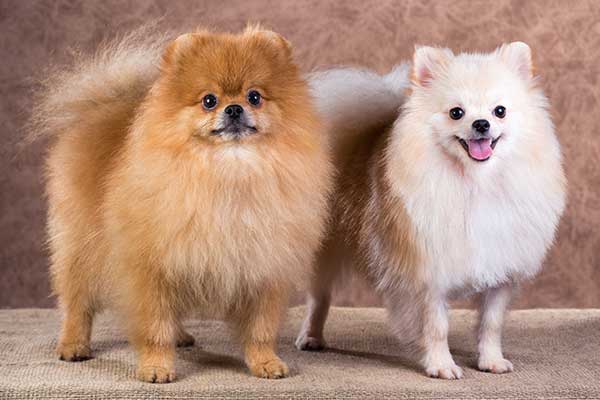
Since much of the allergy-causing protein in dogs is concentrated on the animal’s coat, the first thing you should understand is how regularly your Pomeranian sheds. Indeed, one of the commonly asked questions by pet parents intending to adopt a Pomeranian is, do Pomeranians shed a lot?
Understanding the frequency with which Pomeranians shed is instrumental in helping you determine how regularly you should groom or clean the dog.
While Pomeranians are moderate shedders, experts recommend grooming the dog daily to prevent the accumulation of dander. In addition to keeping your Pomeranian’s coat allergy-free, grooming also helps to maintain the radiance of the dog’s skin.
Last update on 2024-12-29 / Affiliate links / Images from Amazon Product Advertising API
Other measures you can take to reduce the risks of allergy from your Pomeranian include;
- Vacuuming your house daily.
- Washing your dog’s bedding as regularly as you can.
- Cleaning dog urine stains immediately, so that they don’t set in.
- Avoiding contact with your dog’s saliva. That means not allowing your Pomeranian to lick you, your furniture, or other surfaces within the house that you come into regular contact with.
- Having dog-free rooms where you can retreat to if needed.
- Eliminating fluffy carpets, mats, rugs, or other surfaces that trap dog fur.
- Getting a HEPA air filter.
Conclusion: So, are Pomeranians hypoallergenic?
No, they aren’t. However, compared to many dog breeds, Pomeranians present lower risks of allergy as they’re moderate shedders.
Better yet, there are numerous tips you can implement to live with a Pomeranian if you already have a dog allergy.

